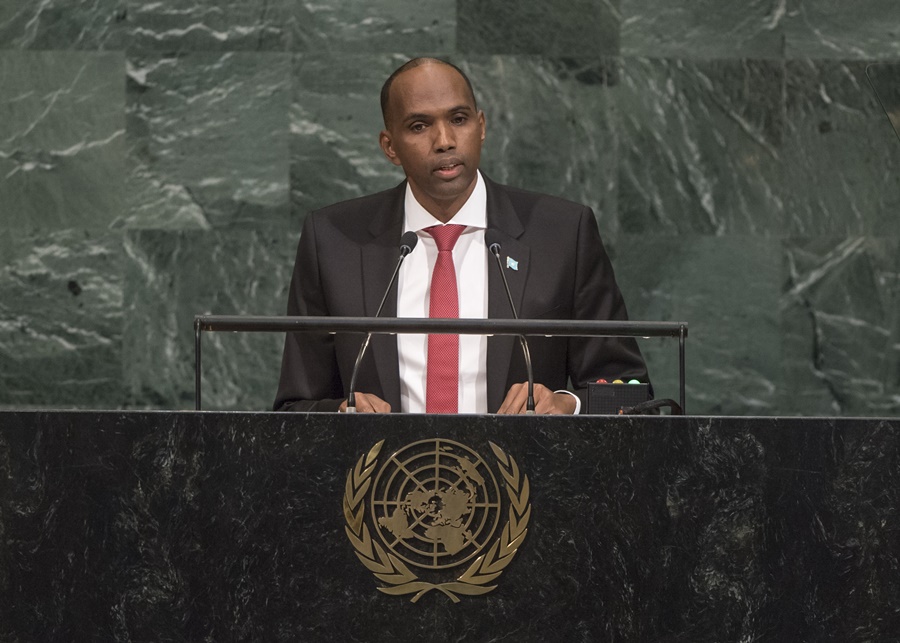Arms embargo and external debt stifling our recovery, Somalia tells global assembly


The 25 year restriction on arms acquisition and the lack of access to credit from international financial institution as a result of outstanding debts in the global market are two of Somalia’s major impediments to stabilization of the state and recovery, Prime Minister Hassan Khaire told a gathering of world leaders Friday.
Addressing the 72nd session of the United Nations General Assembly (UNGA), Prime Minister Khaire said his country’s recovery efforts remain heavily stifled by lack of capacity to build its security forces and decimate the militant group Al-Shabaab and other domestic threats.
Arms embargo
Revisiting the arms embargo question which Somalia has variously called for its lifting, the PM said the remarkable progress made by African Union forces (Amisom) risk being derailed unless Somalia’s security forces are supported to take up the mantle upon Amisom’s exit.
“To ensure the sustainability of such gains, we are focused on strengthening the military capacity of our national security forces. However, the arms embargo imposed against Somalia is a severe limitation towards this objective. The Federal Government of Somalia will continue to work with the Security Council and relevant actors on our road-map towards lifting the arms embargo,” the PM said.
The PM also echoed calls for predictable funding for Amisom which has remained of concern to the Africa Union force, the UN in Somalia and the Federal Government. Amisom warned it will be forced to exit by May next year unless funding is assured to sustain its operations which is billed at close to a billion dollars annually. The PM noted, “We believe that investment in peacekeeping is a worthy investment in peace-building and state-building and we have seen the dividends of this investment in Somalia.”
READ ALSO: Arms embargo a major setback to security of the country-President Farmaajo
The UN Security Council imposed an arms embargo (Resolution 733) on Somalia in 1992 in reaction to the ongoing conflict and deteriorating humanitarian situation but has subsequently eased its restrictions over the years to allow support for the Somali government equip its security forces.
The latest review in 2013 lifted restrictions on deliveries of weapons, military equipment, assistance or training intended solely for the development of the Security Forces of the Federal Government of Somalia, and to provide security for the Somali people.
Embargo is obsolete
But Somalia has argued once again that the arms embargo has outlived its usefulness and it was time to completely lift it especially in light of the expected exit of Amisom as from May 2018. The UN Security Council authorized the withdrawal of the first 500 Amisom troops by December this year and a further 1000 by October 2018.
The UN Security Council has been reluctant to absolute lifting of the arms restrictions over concerns weapons could fall into the hands of militant groups and criminal networks in the country but Somalia has insisted continued embargo is counterproductive to eliminating such threats in the first place.
Debt relief
On debt relief, the PM pitched for international support to help the Horn of Africa country clear its debts to enable it return to the international market for loans and concessions which it seriously needs to fund its development agenda. Currently Somalia is not eligible to credit from the IMF, World Bank and other international lenders owing to its debts which are estimated at $5.4 billion.
“We will continue to formulate measures to strengthen Somalia’s progress including in revenue generation, however, there are some serious challenges beyond the control of the Somali government. Debt relief would have the effect of unlocking concessional financing, attracting foreign investment and providing an opportunity that is critical to sustaining our reform efforts and consequently reinvigorate our economy.”
RELATED: World Bank: Tax reform critical to sustainable growth
Somalia is heavily reliant on foreign and remittances and the World Bank has called for robust reforms in the country’s tax system to boost domestic revenue. It is second Economic Update report May, the World Bank observed Somalia must mobilise domestic revenue collection to support sustainable expenditures, drive development and reduce reliance on external sources.
The PM noted despite the challenges, his government has made significant strides in improving security, re-establishing law and order and conducting the necessary political and socio-economic reforms.
To qualify, for debt relief, a country must go through the High Indebted Poor Countries (HIPC) process developed by the World Bank and the IMF which obliges countries to clear their outstanding debts owed to the two Bretton Woods institutions as a prequalification for the decision point threshold. The international community commits to a level of debt relief, and the country may begin receiving debt relief at this point.